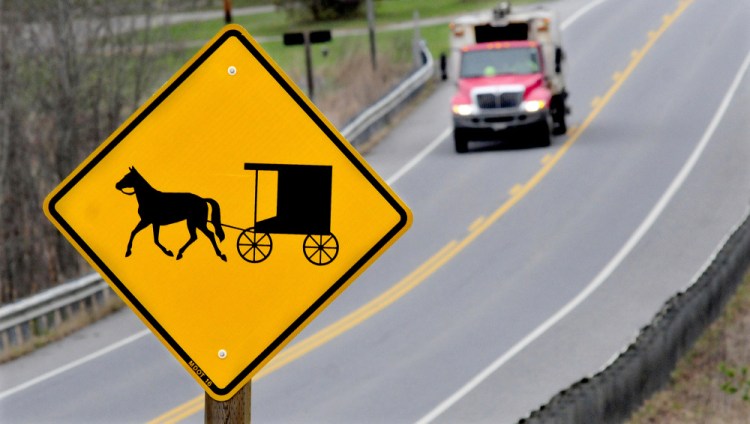AUGUSTA — Lawmakers are considering requiring horse-drawn buggies to display reflectors or lights at night in response to safety concerns on the rural, winding roads surrounding Maine’s growing number of Amish communities.
There have been several crashes in northern and central Maine in recent years involving motor vehicles and horse-drawn carriages or buggies, including one in January in Smyrna that injured several children and killed a horse.
While most of the collisions did not involve injuries, there are growing concerns in Aroostook and Lincoln counties – home to more than a dozen Amish settlements – about the potential for car-buggy collisions on country roads with limited visibility and little or no shoulder.
“It’s impossible for drivers to see buggies at any distance and there’s no margin for error for stopping or swerving to avoid a collision. This poses a serious threat to all,” said Rep. Chloe Maxmin, a Nobleboro Democrat whose district includes Whitefield, a Lincoln County town that has seen an influx in Amish residents in recent years.
Elected officials in Whitefield and in Aroostook County have been working with Amish community leaders for several years on increasing carriage visibility while respecting the conservative and religious beliefs of the Amish. Many Amish buggies now feature reflective tape or oil lanterns as a result of those discussions and consultations with state transportation officials.
But two bills pending in the Legislature propose to replace those informal, local agreements with standardized requirements around the state.
“I’ve gone to extreme measures to ensure that this bill, should it become law, is supported by the Amish and is a considerable improvement in the area of traffic safety,” Rep. David McCrea of Fort Fairfield, the sponsor of one of the bills, told members of the Legislature’s Transportation Committee.
As originally proposed, McCrea’s bill, L.D. 198, would have required both reflective tape and a reflective orange triangle on the rear of the buggy. Conservative Amish in Maine and elsewhere object to the color and shape of the latter, so on Tuesday, McCrea outlined a compromise that he said appears to be agreeable to the leaders with whom he and others have been meeting.
The compromise would require specific amounts of reflective white tape on the front, rear and sides of buggies at various heights. Additionally, buggies would be required to hang an oil lantern that shines red when viewed from the rear and white when viewed from the front.
McCrea told Transportation Committee members that the multiple Amish settlements “have contributed a great deal” to his area of Aroostook as they transform marginal farmlands, sell farm products, offer building services and pay into the local tax base, he said.
“Suffice it to say, the influx of Amish communities in our rural part of Maine has been a very positive thing in the eyes of most of our residents,” McCrea said.
But road safety is the top issue he that McCrea’s constituents have raised with him in recent years. To address the issue, McCrea and other local elected officials have held about a half-dozen meetings with representatives of the Amish communities to find an agreed-upon solution.
“I can’t tell you how many people have been scared to death by coming upon one of these (buggies), myself included,” McCrea said.
Whitefield officials have also negotiated an informal agreement with members of growing the Amish community located just southwest of Augusta. Amish buggies now share narrow, curving roads that get considerable commuter traffic because of the town’s proximity to Augusta.
Tony Marple, chairman of the Whitefield Board of Selectman, said there have been three crashes involving buggies in the three years since the Amish began moving to the area three years ago.
“Nobody has been injured and the Amish community views this as fate so they aren’t particularly worried about these accidents,” Marple said. “But the other citizens in town view this as a big emotional risk. There are often families in these buggies, with children and wives and so forth, so they are terrified.”
Members of Whitefield’s Amish community already display several strips of white reflective tape – approved by the Maine Department of Transportation because of its high visibility – on buggies. But Marple said community members have agreed to add more reflective tape and offered to hang two lanterns on either side of their buggies at different heights to signal to drivers that they are not approaching a conventional vehicle.
“The Whitefield board feels what they’ve proposed is really fair and a big improvement over what we’ve seen,” Marple said.
No members of Amish communities attended Tuesday’s public hearing at the State House.
However, Whitefield resident Ben Zook said Tuesday evening at his family’s farm that he believes what he and his fellow Amish community members have agreed to would likely comply with the proposal offered by McCrea. Many of the Whitefield residents belong to the same, more conservative and traditional subgroup of the Amish – known as Swartzentruber Amish – as those in Aroostook County.
“What’s good for them is good for us, too,” Zook said.
Zook, who settled in Whitefield with is family last year, pointed out that many community members already have ordered second lanterns to hang on their buggies, which would go beyond McCrea’s current proposal.
“We are definitely trying to accommodate and work with them as far as the safety issues go,” Zook said.
The Transportation Committee will likely discuss McCrea’s modified bill as well as a second more straightforward measure, L.D. 526, at a later date.
Kevin Miller can be contacted at 791-6312 or at:
Send questions/comments to the editors.



